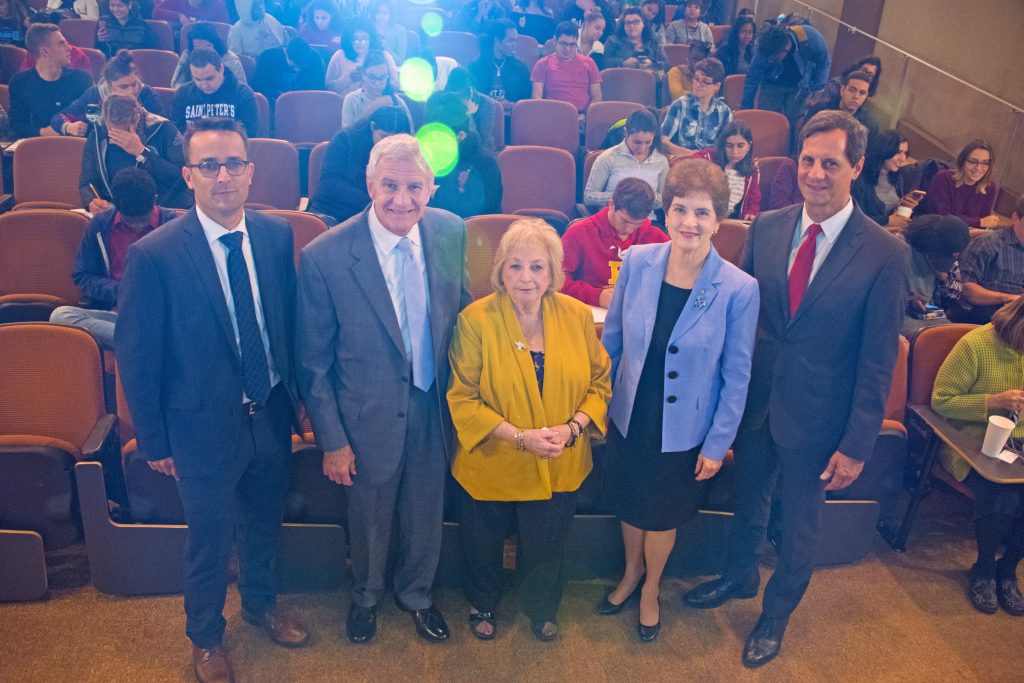 Saint Peter’s University welcomed a unique visitor to campus, Eva Wiener—a Holocaust survivor. Students were able to learn first-hand about the Holocaust and hear her family’s story.
Saint Peter’s University welcomed a unique visitor to campus, Eva Wiener—a Holocaust survivor. Students were able to learn first-hand about the Holocaust and hear her family’s story.
Wiener’s story is atypical; she was an infant on board the German transatlantic liner M.S. St. Louis. Prior to boarding the boat, tensions in Germany were building, as the Nazi party was beginning to target Jews. The turning point, Kristallnacht, or “Night of Broken Glass,” was an attempt to accelerate the pace of forced Jewish emigration. That night, windows of shops were broken, lives were destroyed and there was an increased urgency for Jews to leave Germany. In addition, Wiener’s father was banished back to Poland where he was born. Her mother, still in Germany, wrote to numerous embassies for a visa to any country, including a letter she wrote to her brother in Cuba asking him to expedite her citizenship there. Eventually her application for citizenship to Cuba was approved.
The family, including her father, who had returned for the voyage, planned to stay in Cuba until the United States granted them visas. They did not know how long they would be in Cuba since achieving a visa to the U.S. was administered through a random lottery. At the time, Wiener’s family saw Cuba as a tropical paradise. They were happy to take a boat and wait there. When they got to the dock in Germany to board the boat, they were positive. The boat was large and beautiful. It even had a swimming pool. However, no one on board knew that this boat was a ploy by the German government. When they got to the Cuban port, Cuba would not allow most of the 937 passengers to disembark.
“No one wants these people—we are doing you a favor, we are getting rid of these people for you,” Wiener said to paraphrase the Nazi Party’s propaganda; they were using Cuba as an example to other countries, and making the Jews sound like varmints.
“Aboard the ship, we were all doctors, business people, high-class, well-to-do people who could afford to pay for the ship, which by-the-way we were made to pay round trip fare for even though we knew we would never return. We would not be a burden to any country,” said Wiener.
However, lucky for the passengers, the captain was adamant about not returning to Germany. He tried his lock docking in other places such as Miami, but was denied. Those aboard the ship did not want to return to Germany, the place they once called home. They begged the captain not to take them back.
“My mother told me my first word was nien, not the number nine, but ‘no’ in German because I overheard the passengers yelling, ‘No, no, no, we won’t go back,'” Wiener said.
Eventually, the passengers received word from four countries that would accept some of the passengers. Those countries were France, the Netherlands, Belgium and England. Wiener’s father, who wanted to be as far away from Germany as possible, requested the family be placed in England and it was fortunate that he did. The Nazis soon invaded France, Holland and Belgium and the passengers from the St. Louis seeking refuge there were likely sent to concentration camps or killed.
Eventually, years later, in 1946, the United States offered Wiener a visa and she has lived in America on the east coast since. In 2009, 70 years after the St. Louis was denied entry, the United States issued an apology for not allowing the boat to dock.
“Better late than never,” Wiener responded to a student inquiry about her feelings toward the apology.
“I am a survivor, because I was part of significant history. The message is that simply because I was Jewish, I was force to leave a country behind because prejudice, bigotry, hate and antisemitism created an atmosphere that turned the world upside down. I want to be the spokesperson for those who were not able to tell their stories and who will not be able to tell their stories much longer. We must be watchful and vigilant and careful not to judge others based on our differences,” she concluded.
